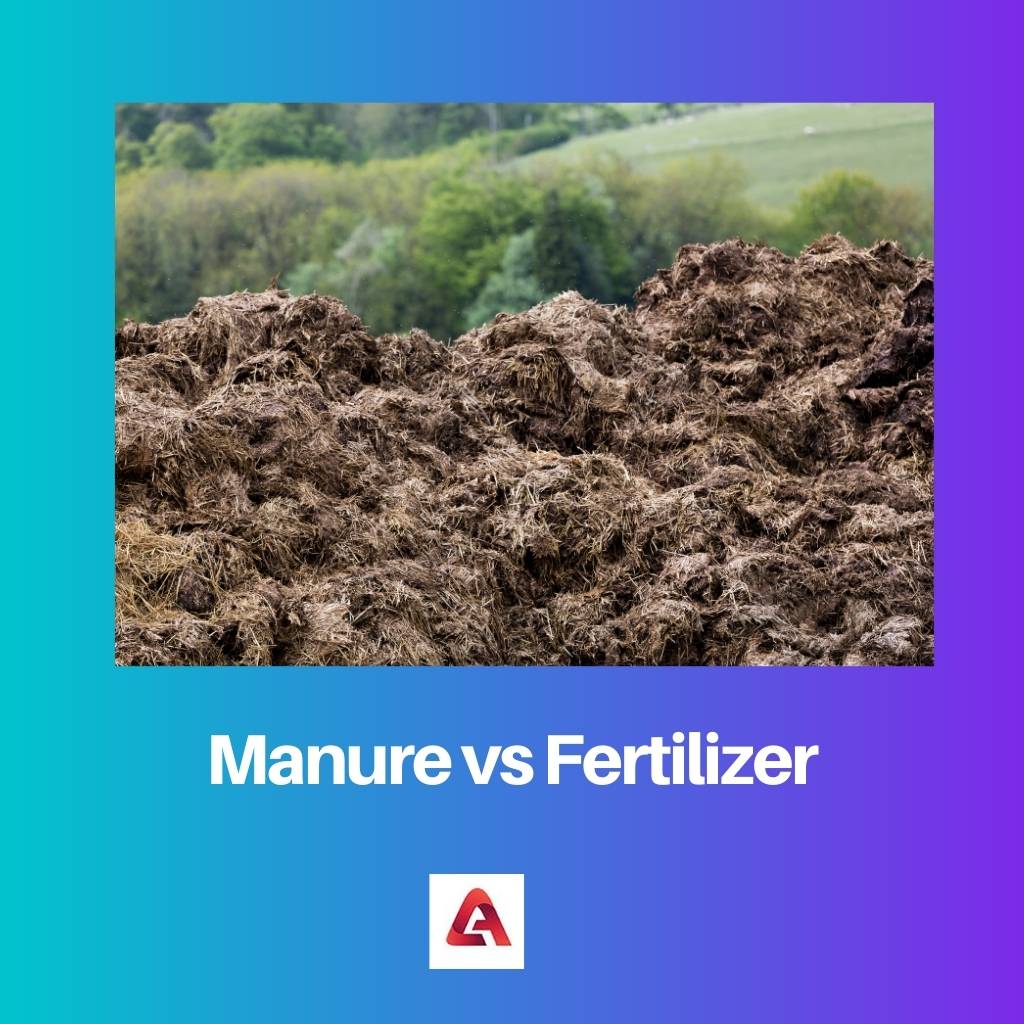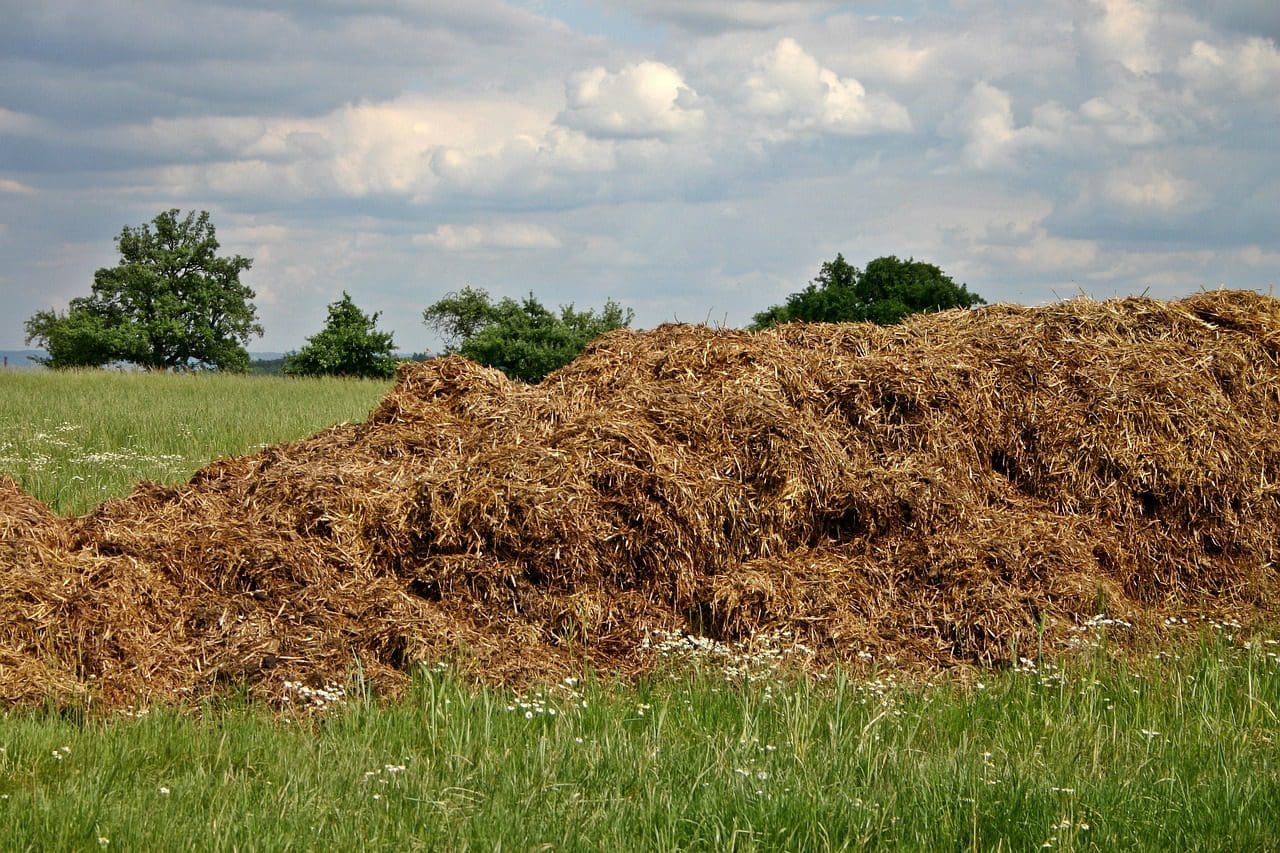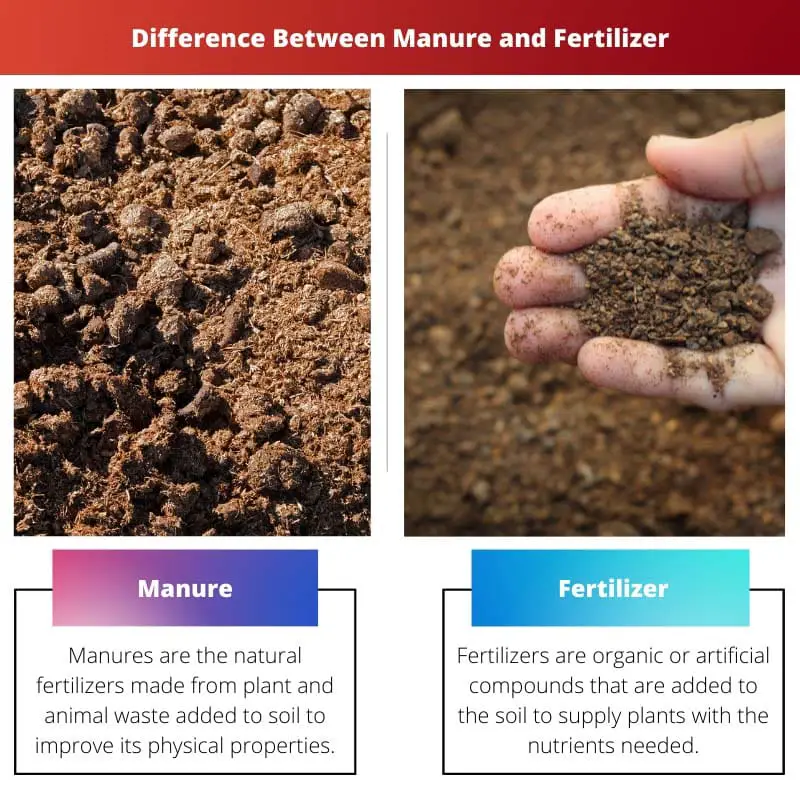Plants require certain nutrients, such as nitrate, magnesium, etc., that they take from the soil. However, if the soil is deficient in key minerals that these plants require to thrive, then manure and fertilizer compensate for the soil’s sterility.
These minerals and nutrients must then be supplied to the soil for it to become productive.
Key Takeaways
- Manure is organic waste from animals; fertilizer is a chemically processed, nutrient-rich substance.
- Manure improves soil structure and water retention; fertilizer provides immediate nutrients for plant growth.
- Manure releases nutrients slowly over time; fertilizer offers quick nutrient availability.
Manure vs Fertilizer
Manure is a naturally occurring organic material derived from animal waste and is considered a natural source of plant nutrients. Fertilizer is a synthetic substance with specific chemical compounds that are manufactured to promote plant growth.

Manures are a form of natural fertilizer. To generate manure, farmers decompose plant and animal waste. Manure is the result of this breakdown in organic matter. Nutrients are low in manure.
Rather, it enriches the soil with humus, making it more fruitful. This improves the soil’s physical properties, allowing it to retain more moisture and increase aeration.
Fertilizers are organic or synthetic chemicals that are added to soil to provide nutrients to plants. They might be organic or inorganic. They provide the plants and crops with the nutrients they need to grow to their max capability and faster than natural means.
Chemical fertilizers also act as pesticides, preventing pests and insects from damaging plants.
Comparison Table
| Parameters of difference | Manures | Fertilizers |
|---|---|---|
| Definition | Manures are the natural fertilizers made from plant and animal waste added to soil to improve its physical properties. | Fertilizers are organic or artificial compounds that are added to the soil to supply plants with the nutrients needed. |
| Cost-effective | Manures are more expensive than fertilizers. | Fertilizers are very cost-effective and affordable to farmers. |
| Effect on soil and environment. | Manures are natural fertilizers, hence they do not harm the soil and are environment friendly. | Excess use of fertilizers can cause soil degradation and harm the environment |
| Nutrition content and growth. | Manures have fewer nutrients than fertilizers and growth is relatively slower. | Fertilizers are rich in nutrients and grow plants faster and more effectively than manures. |
What is Manure?
Plant and animal wastes make manures that are utilized as a supply of plant nutrients. After decay, they produce nutrients for the plants. Agriculture predates the skill of gathering and utilizing waste from animal, human, and vegetable sources to improve crop output.
Effective usage is necessary to boost the advantages of manure compost in gardening. Blending manure with soil is one of the most effective methods to utilize it as a natural fertilizer. The risk of harm to the plants is eliminated when manure is composted.
Another alternative is to till it into the soil in the wintertime or before planting in the spring. Usually, the ideal time to utilize manure in the garden is in the fall. This gives the manure more than enough time to break down, reducing the risk of burning plants in the garden.
Manure has been utilized as a fertilizer, soil amendment, energy source, and even building material by livestock and poultry farmers throughout history. Nutrients, organic matter, minerals, energy, and fiber are among the many beneficial, recyclable compounds present in manure.
Manure may be obtained in a variety of ways. Waste from cattle – urine, dung, and liquid mix or slurry from biogas plants can be used very commonly to make manure.

What is Fertilizer?
Fertilizers are organic or artificial compounds that are added to the soil to supply plants with the nutrients needed. They might be either organic or inorganic.
They function by supplying plants and crops with the nutrients they require to develop to their full potential and quicker than possible through natural means.
Chemical fertilizers also work as insecticides, keeping pests and insects away from plants. With so few resources, meeting the expectations of an ever-increasing population is extremely challenging.
A decline in agricultural productivity has been caused by a loss of soil fertility, pests, and a shortage of nutrients. Fertilizers have become even more important in agriculture as a result of this.
Fertilizers are extremely cost-effective for farmers. They help plants grow faster and are quite affordable and readily available. Excess fertilizer nutrients flow off into bodies of water, causing algal blooms.
Algal blooms can occasionally obstruct the flow of rivers. When algae die, they settle at the bottom of water resources, lowering oxygen levels in the water. Excess fertilizer usage also depletes the soil’s fertility.
Inorganic fertilizers include such as nitrogen fertilizers and phosphorus fertilizers. Agricultural waste, livestock manure, and municipal sludge are all examples of organic fertilizers.

Main Differences Between Manure and Fertilizers
- Manures are natural fertilizers made from animal and plant waste, whereas Fertilisers can be both natural or synthetic.
- Manures are not as cost-effective as fertilizers. Fertilizers are comparatively cheaper and easily available.
- Fertilizers grow plants faster and more effectively than manures. Manures do not have a higher content of nutrients than fertilizers.
- Manures are organic, so they do not cause any harm to the soil. However, excess use of fertilizers can make the soil acidic and cause soil degradation.
- Chemical fertilizers like pesticides can be harmful to the environment as they are not biodegradable. Manure does not harm the environment, being composed of natural components.

- https://books.google.com/books?hl=en&lr=&id=S0o0IDMJORYC&oi=fnd&pg=PR5&dq=manures+and+fertilizers&ots=O1y5dhRbdH&sig=XYEubWmOxGhRskp4oqmmSNff9yU
- https://www.tandfonline.com/doi/abs/10.1080/03650340701571033

The description of how chemical fertilizers work as insecticides is an interesting aspect that adds depth to understanding the nature of fertilizers and their dual roles.
I agree, the information about the multifaceted value of chemical fertilizers was an eye-opener, clearly defining their role in agriculture.
The detailed content about the benefits and various types of manure is very educational and provides a holistic understanding of its application in agriculture and farming.
Absolutely, the in-depth information about manure types and benefits is well-researched and greatly enlightening.
The article provides a comprehensive comparison of manure and fertilizer in a very well organized and informative manner, thank you for the valuable insights.
I completely agree, the article was well-written and the information was presented concisely and effectively.
The information provided about the impact of excess fertilizer on water bodies sheds light on the potential environmental consequences, which is an important aspect to consider in agriculture.
The comparison table detailing the cost-effectiveness, environmental impact, and nutritional content of manures and fertilizers is extremely helpful for decision-making in agriculture.
Agreed, the table provides a quick reference for evaluating and understanding the differences between manures and fertilizers.
I appreciate the detailed comparison between manure and fertilizer, it really helps in understanding the benefits of each.
Absolutely, the clear distinction between the two is quite useful for those looking to enhance their knowledge about soil nutrients.
The detailed explanations about the uses and advantages of manure as well as fertilizers are commendable, the article does an excellent job of highlighting the characteristics of each.
Absolutely, the clarity in describing the uses of manure and fertilizers is commendable, making it easier to make informed choices.
I couldn’t agree more, the insights provided are extremely valuable for individuals involved in agriculture and gardening.
The section about the effectiveness of manure compost in gardening and the ways to utilize it was particularly insightful.
Indeed, the tips for making the best use of manure in gardening were enlightening, making this article a valuable resource for gardeners.
The historical context of manure and its varied uses throughout history provides a rich perspective on its significance, making the article engaging and informative.
The challenges and benefits of using fertilizers in agriculture are well-articulated, providing a balanced view of their impact and importance, this article is truly enlightening.
Absolutely, the article offers a coherent analysis of the uses and implications of fertilizers, greatly enhancing understanding of their role in agriculture.